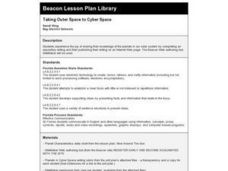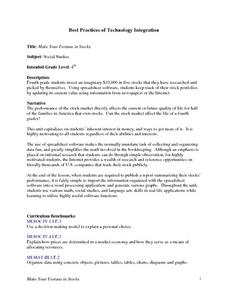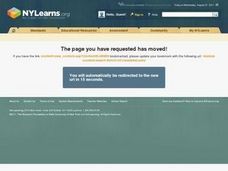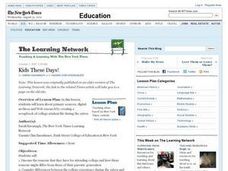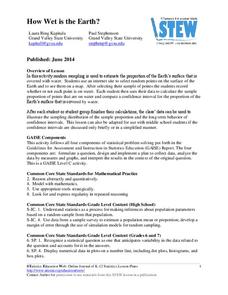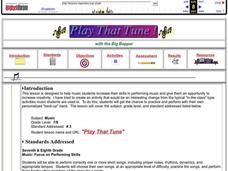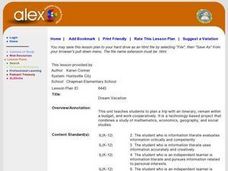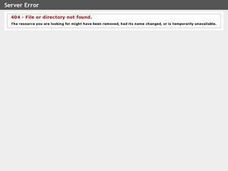Curated OER
Taking Outer Space to Cyber Space
Use the Internet, write an expository text, and have students share their knowledge of the planets in our solar system. They compose an expository writing piece and publish it to a web page.
Curated OER
Ancient Roman Travel Brochure
Ancient Rome is the topic of this creative lesson plan. Students research Ancient Rome using the links provided, and then create a travel brochure using Microsoft Publisher. What a fun way to review facts on Ancient Rome!
Curated OER
Social Studies Wonders: An Exploration
Help middle schoolers conduct Internet research and develop a working definition for the discipline of social studies. From a list of websites, they develop classification skills and differentiate between primary and secondary sources....
Curated OER
American Government
Challenge your students with this lesson on American government! Learners discuss the three branches of government and its responsilbities, and then go on to more complex critical-thinking activities. Students interview members of the...
Curated OER
Make Your Fortune in Stocks
Fourth graders participate in a stock investment activity in which they research stocks to place in an imaginary portfolio. They invest $10,000 in a variety of stocks and track their progress using the Internet or newspapers.
Curated OER
What is a Fable?
Students read a variety of electronic Aesop's fables to define fable and moral, and write and illustrate an original fable. They then publish their fable using PowerPoint.
Curated OER
Hear Ye, Hear Ye: Read All About It!
Develop an online newspaper covering the Lewis and Clark Expedition. The class publishes their newspaper on the school's Web site and analyze both primary and secondary sources.
Curated OER
Digging Up Dinosaurs
Students research dinosaurs using text, software, and Internet resources while role playing as paleontologists. They place the information from their research in databases and publish an illustrated page about their findings.
Curated OER
Kids These Days!
Students create a scrapbook of college student life during the 1960's using digital archives and Internet research. They read and discuss the article "What's the Matter With College?" and then compare college experience of today with...
Statistics Education Web
How Wet is the Earth?
Water, water, everywhere? Each pupil first uses an Internet program to select 50 random points on Earth to determine the proportion of its surface covered with water. The class then combines data to determine a more accurate estimate.
Curated OER
I Spy Poetry
Explore the components of rhythm and form through a reading of Jean Marzollo's I Spy books. After discussing Marzollo’s format, the class agrees upon a theme for a class book and topics that fit with that theme. Pupils write a poem,...
Curated OER
Name That Tune
Integrating technology and music can be a snap with lessons like this one! Kids in a junior high band class took to the Internet to download and practice playing their instrument with a computer generated back up band. They practice...
Curated OER
Considering U.S. Policy
Students explore policies regarding environmental issues. In this global issues lesson, students research the linked Internet sources to investigate governmental policies to decrease environmental issues.
Curated OER
Easy Access: Creating Annotated Versions of News Articles
How can news coverage be made more accessible for teens? Model for your class how to use technology to annotate news stories containing unfamiliar references that hinder their interest in and understanding of a news story. Use the...
Curated OER
Critical Ways of Seeing The Adventures of Huckleberry Finn in Context
Students complete a unit of lessons examining the cultural context of the novel, 'The Adventures of Huckleberry Finn.' They write a critique of the novel, compare/contrast two published critiques, and explore various websites.
Curated OER
Portraits, Pears, And Perfect Landscapes: Investigating Genre in the Visual Arts
Differentiate between the various genres in the visual arts world, particularly in Western painting. Your class can view and discuss, in small groups, paintings published on the National Galleries website. Then each student individually...
Curated OER
The Black Death and HIV/AIDS: Which is the Worse Plague?
Exploring the similarities and differences between the Black Death and HIV/AIDS, students write persuasive essays answering which is the "worse plague." This cross-curricular activity between Language Arts and Social Studies addresses...
Nemours KidsHealth
Human Body Series: Immune System
When you work with school children, teaching about immunity and illness prevention is a priority! This approach includes a discussion, kid-friendly online articles, a creative writing assignment, and a quiz on the role of leukocytes and...
Curated OER
Patch Tool
Students use an Internet tool to explore shapes and how they combine. In this patterns lesson, students create quilting patterns using various shapes. Students recognize how the shapes fit together.
Curated OER
Dream Vacation
Learners research cities, states, or countries using the internet and other resources to learn about a vacation spot. They make a final presentation of their findings in forms other than a written report.
Curated OER
Adding Flags and States to you State Report
Third graders word process, edit text and add images from the Internet to a document. They explore copyright, fair use, how to evaluate web sites and citing sources.
Curated OER
Research a State in the United States
Students research one state of the United States of their choice. Using the internet, they gather as much information about the state as possible along with appropriate images. They present their findings to the class in the form of a...
Curated OER
Net Gains
Students experience internet tutorials. They write a journal about how people use the Internet. Students explore web sites on internet training. In groups, students research an internet skill and create a guide for learners.
Curated OER
Production Time
Seventh graders identify terms related to computer-generated productions (e.g., desktop publishing, WYSIWYG, clip art, hypertext, multimedia, laserdisc, CD-ROM, VCR, scanners, camcorders).
